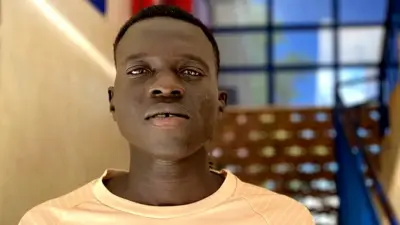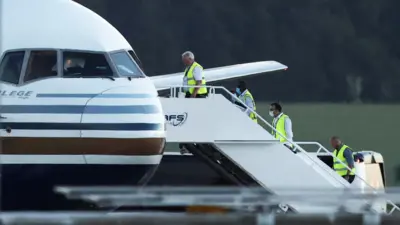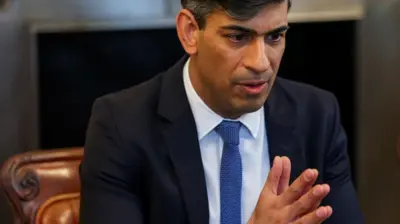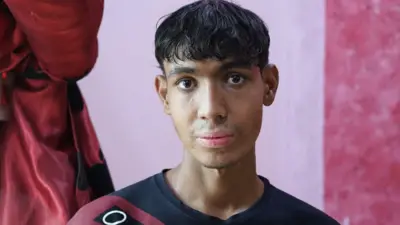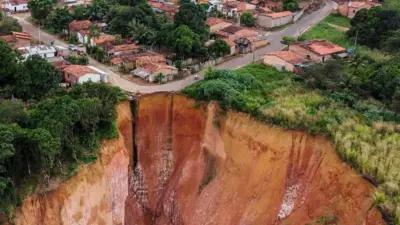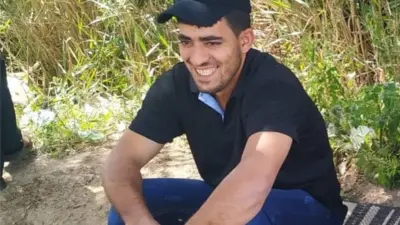We've updated our Privacy and Cookies Policy
We've made some important changes to our Privacy and Cookies Policy and we want you to know what this means for you and your data.
Covid-19: Javid says get jab or restrictions likely, and Morocco bans UK flights
Here are five things you need to know about the coronavirus pandemic this Wednesday evening. We'll have another update for you tomorrow morning.
1. Get a Covid jab or restrictions are more likely, Javid says
If not enough people get vaccinated, it is more likely restrictions will be reintroduced in England, the health secretary has said. At a Downing Street press conference, Sajid Javid said he did not believe the current pressures on the NHS were unsustainable and so Plan B measures, like mandatory face coverings and working from home, would not be brought in "at this point". However he warned cases could rise to 100,000 a day. His comments follow NHS leaders calling for some restrictions to be reintroduced immediately if England is to avoid "stumbling into a winter crisis". Read more about Plan B here.
2. UK-Morocco flights banned
Morocco has banned flights to and from the UK over concerns about rising case numbers. Several UK airlines and holiday companies have been told by the Moroccan government that flights will be suspended from 23:59 BST on Wednesday until further notice. Flights between Morocco and Germany and the Netherlands have also been suspended. Latest figures show Morocco's weekly rate of reported cases on 14 October stood at 10.4 per 100,000 people, compared with 445.5 per 100,000 people in the UK.
Image source, Getty Images
3. Supply teacher shortage could force Welsh schools to close - unions
Some Welsh schools are at tipping point and could be forced to close because of a lack of staff, the UCAC union has warned. The union says self-isolation due to Covid has exacerbated a supply teacher shortage that existed before the pandemic. Another union - the NAHT - wants the Welsh government to review measures to reduce the spread of Covid in schools.
Image source, Getty Images
4. Care staff shortage 'harms services for thousands'
Managers of community care services supporting more than 15,000 people in England, say acute staff shortages are forcing them to turn down new clients. The National Care Forum of mainly not-for-profit organisations, says care providers are having to make tough decisions about who they can help. Last week health bosses said the care shortage meant more patients judged fit to go home were stuck in hospital. The government is promising extra money to train and recruit new care workers.
Image source, Getty Images
5. London travellers without masks prosecuted
Nearly 2,000 people have been prosecuted for not wearing face coverings on London's public transport, figures show. From June 2020 until July this year, everyone travelling on the transport network was required to wear a mask unless exempt, as a condition of carriage - or else face a fine from Transport for London. If unpaid, that could lead to a prosecution. Wearing a mask is still a condition of carriage but not a legal requirement, meaning people cannot be fined.
Image source, Getty Images
And don't forget...
You can find more information, advice and guides on our coronavirus page.
As daily case numbers in the UK near 50,000, we consider why they are so high right now.
Image source, BBC
What questions do you have about coronavirus?
In some cases, your question will be published, displaying your name, age and location as you provide it, unless you state otherwise. Your contact details will never be published. Please ensure you have read our terms & conditions and privacy policy.
Use this form to ask your question:
If you are reading this page and can't see the form you will need to visit the mobile version of the BBC website to submit your question or send them via email to YourQuestions@bbc.co.uk. Please include your name, age and location with any question you send in.
- "THIS IS THE WORST INTERVIEW I EVER DID": Looking back at when Ruby Wax met Donald Trump
- THE DEEPER YOU GO, THE DARKER IT GETS: Brand new thriller Vigil starring Suranne Jones
Top Stories
Features & Analysis
Most read
Content is not available
